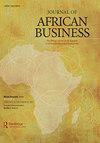非洲组织变革管理的情境化:融入Ubuntu的核心价值观
IF 1.8
Q3 BUSINESS
引用次数: 1
摘要
大多数商业模式和理论都是基于盎格鲁-撒克逊人的世界观来帮助组织适应当今动态的商业环境。然而,大多数学者承认,这些理论在盎格鲁-撒克逊世界以外的文化中应用有限。将西方构想的管理理论与本土本体论相结合的研究非常缺乏。为了缩小这一差距,本文从非洲的角度讨论了管理变化,具体涉及撒哈拉以南非洲。它利用遍及次大陆的Ubuntu哲学作为变革管理可以锚定的基石,声称拥抱Ubuntu价值观为管理非洲的组织提供了最好的结果。利用Kurt Lewin的变更管理模型,本文展示了如何在执行中结合基于ubuntu的本地本体可以导致次大陆的可持续变更管理。本文章由计算机程序翻译,如有差异,请以英文原文为准。
Contextualizing Organizational Change Management in Africa: Incorporating the Core Values of Ubuntu
ABSTRACT Most of the business models and theories available to assist organizations in adapting their strategies to today’s dynamic business environment are based on the Anglo-Saxon worldview. Yet most scholars acknowledge that these theories have limited application in cultures outside of the Anglo-Saxon world. There is a dearth of research that infuses Western conceived theories of management with indigenous ontologies. To close this gap, this paper discusses managing change from an African perspective with specific reference to sub-Saharan Africa. It utilizes the philosophy Ubuntu that pervades the subcontinent as the bedrock on which change management can be anchored, asserting that embracing the Ubuntu values offers the best outcomes for managing organizations in Africa. Using Kurt Lewin’s change management model, the paper shows how incorporating the indigenous ontologies based on ubuntu in its execution can lead to sustainable change management in the sub-continent.
求助全文
通过发布文献求助,成功后即可免费获取论文全文。
去求助
来源期刊

Journal of African Business
BUSINESS-
CiteScore
4.60
自引率
10.50%
发文量
36
期刊介绍:
Journal of African Business is the official journal of the Academy of African Business and Development, the largest network of professionals committed to advancement of business development in African nations. JAB strives to comprehensively cover all business disciplines by publishing high quality analytical, conceptual, and empirical articles that demonstrate a substantial contribution to the broad domain of African business. Regardless of the research context, tradition, approach, or philosophy, manuscripts submitted to JAB must demonstrate that the topics investigated are important to the understanding of business practices and the advancement of business knowledge in or with Africa. Particularly, JAB welcomes qualitative and quantitative research papers. JAB is not, however, limited to African-based empirical studies. It searches for various contributions, including those based on countries outside Africa that address issues relevant to African business. Targeted toward academics, policymakers, consultants, and executives, JAB features the latest theoretical developments and cutting-edge research that challenge established beliefs and paradigms and offer alternative ways to cope with the endless change in the business world. Covered areas: Accounting; Agribusiness Management and Policy; Business Law; Economics and Development Policy; Entrepreneurship and Family Business; Finance; Global Business; Human Resource Management; Information and Communications Technology (ICT); Labor Relations; Marketing; Management Information Systems (MIS); Non-Profit Management; Operations and Supply Chain Management; Organizational Behavior and Theory; Organizational Development; Service Management; Small Business Management; Social Responsibility and Ethics; Strategic Management Policy; Technology and Innovation Management; Tourism and Hospitality Management; Transportation and Logistics
 求助内容:
求助内容: 应助结果提醒方式:
应助结果提醒方式:


